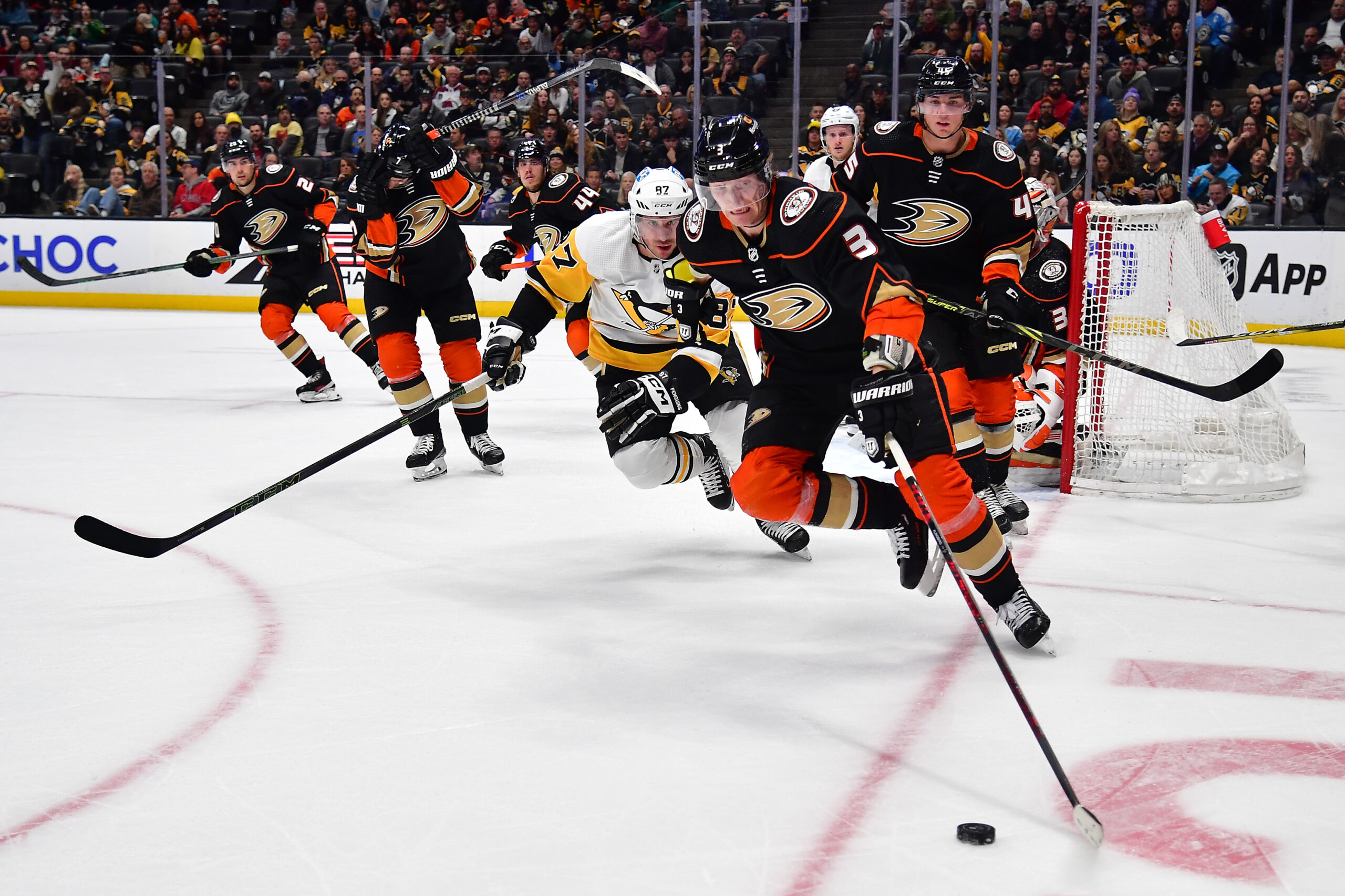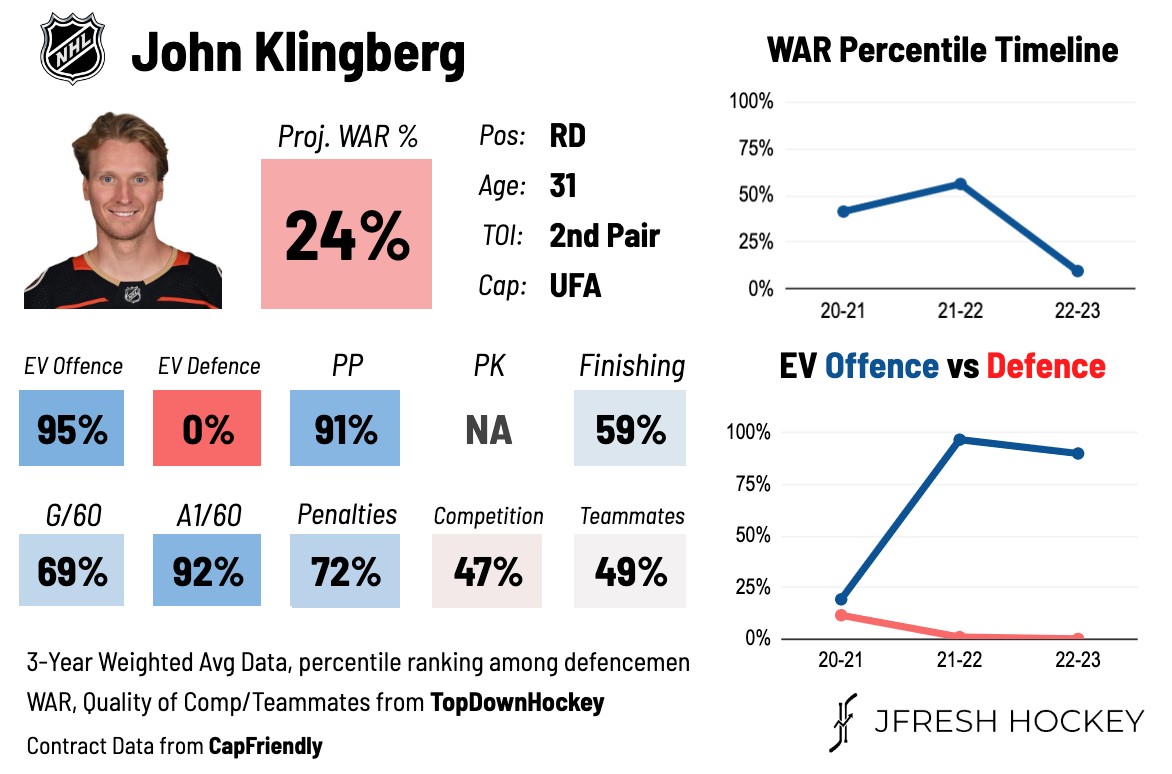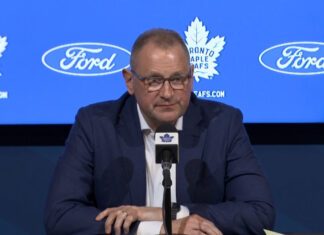The Maple Leafs have attempted to shore up the right defense position following the departure of Justin Holl, signing veteran puck-moving defenseman John Klingberg to a one-year contract worth $4.15 million.
The 6’3, 190-pound Klingberg, 30 years old, is a once-elite point producer and former top-pairing defenseman, peaking with 67 points as a 24-minute/game defenseman in Dallas during a 2017-18 season that led to a sixth-place finish in Norris voting. His career has declined to the point where he’s now signed back-to-back one-year contracts, this time with a significant paycut from last year’s $7 million contract with the Anaheim Ducks. He’s coming off of the lowest ice-time totals of his career — which, to be fair, still eclipsed 20 minutes a night with a 20:37 average split between the Ducks and the Wild after Minnesota picked him up via trade for their playoff run.
Klingberg appeared in just four games of the Wild’s first-round series loss to his former team in Dallas (he was battling a lower-body injury), but he tallied four points in those four games. During the Stars’ run to the Finals in 2020, Klingberg rattled off 21 points in 26 postseason games — 14 at even-strength, seven on the power play — while averaging over 23 minutes a game, albeit he still finished in the red in terms of even-strength goal differential at minus-five during that run. Therein lies the rub with Klingberg — oodles of offensive talent, but he gives a lot of it back defensively to the point where he’s clearly not at all suited to play in high-leverage situations against tough competition. He is a combined -53 in his last two seasons spanning his time in Dallas, Anaheim, and Minnesota.
Not a great fit stylistically next to Morgan Rielly, he’ll probably slide onto a pairing with either Jake McCabe or Mark Giordano, and he does check a couple of boxes when it comes to handedness and the Leafs’ need to manufacture more offense out of their blue line outside of Rielly, particularly at playoff time.
Between 2019-20 and 2022-23, the Leafs received 51 points and 241 shots on goal in 184 man games from their defense in the playoffs, and the numbers are putrid when we remove Rielly – 154 games played, 29 total points, and 166 shots on goal collectively from the 15 other Toronto defensemen who have dressed over the last four playoff runs. While so much of the attention over the years has fixated on the Leafs’ stars offense drying up in the postseason, particularly as series wear on, this is a notable part of the overall equation when it comes to the Leafs’ inability to score enough at playoff time. Based on his track record of production (particularly at playoff time), Klingberg should help out in this regard provided he’s well-insulated defensively from a deployment standpoint.
Klingberg has scored 10 or more goals four times — albeit not since 2018-19 — and broken the 40-point barrier six times, including 67- and 58-point seasons. He’s seventh in the NHL in points among defensemen at five-on-five since he broke the league and eighth in points over all situations. Joining one of the top offensive teams in the league and playing in offensive situations alongside the Leafs’ elite scoring talent should provide an opportunity for Klingberg to work his way back up the defensive scoring charts provided he’s healthy, which it should be mentioned has been a question mark for Klingberg over recent years.
Whether Klingberg or Rielly mans the top power-play unit remains to be seen and could be a fluid situation. It’s an important part of Klingberg’s game in terms of his offensive production and overall confidence level, and Rielly has been a consummate professional whenever he’s been asked by the coaching staff to take a backseat by manning the second unit over the years.
It remains to be seen if the (aging) Giordano or McCabe are the right match to complement Klingberg’s skill set and glaring defensive flaws, but any risk of a poor fit here is somewhat mitigated by the one-year term, and there are a few roster needs filled here in regards to offense from the defense and competent NHL right-shot defensemen. However, he definitely doesn’t fill the gap created by Holl’s departure in terms of the ability to play (mostly) competent shutdown minutes as needed or kill penalties.


































